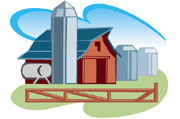Bulletin #2332, Maine Farm Safety Program: Working Around Vehicle Problems Safely

Bulletin #2332, Maine Farm Safety Program: Working Around Vehicle Problems Safely (PDF)
By Dawna L. Cyr, Farm Safety Project Assistant, and Steven B. Johnson, Ph.D., Extension Crops Specialist
For information about UMaine Extension programs and resources, visit extension.umaine.edu.
Find more of our publications and books at extension.umaine.edu/publications/.
Avoiding Overturns and Runovers
Overturns and runovers are the two leading causes of tractor-related deaths. Install a ROPS (Roll-Over Protective Structure) with safety belts on tractors where they can be added. Always wear the safety belt with ROPS. Allow no extra riders on equipment. Make sure everyone is out of the way before moving. Never bypass start a tractor because it may be in gear. When working on steep areas, widen the wheelbase.
Don’t Get Caught
Disengage drives and turn off the engine before leaving the driver’s seat. Make sure everyone knows how to safely stop all motors, drives, and augers. Stay clear of moving parts and keep others away. Wear well-fitted clothing and be cautious with jewelry that may be caught in machinery. Keep protective shielding in place. Stay away from unshielded moving parts. Always stop the machine before unclogging or tending to mechanical problems.
- Install a ROPS with a safety belt on tractors where they can be added.
- Properly support equipment when working under it.
- Disengage drives before leaving driver’s seat.
Freeing Mired Vehicles
Freeing mired vehicles is a dangerous job. Accidents occur when tractors overturn, tow chains and cables break, unattended vehicles roll and crush people between them, vehicles shift and trap people digging under them, and towing vehicles pull out in front of other traffic as the stuck vehicle is freed. Attach tow lines only to drawbars, trailer hitches or tow eyes. Use tow cables with caution. These cables can break and snap wildly. Do not use nylon ropes. They can break violently. Always be alert to traffic on or near a roadway. Do not get between the stuck vehicle and the one towing it out.
Working Under Equipment
Working under equipment can be very dangerous. Equipment that is not properly supported can fall and crush people. Hydraulically supported equipment such as combine headers, loader buckets and hitch-mounted implements are especially vulnerable. If a line breaks, a valve leaks, or the control lever is moved, equipment will fall. Make sure all safety supports are in place or that equipment is fully blocked before working under it. Make sure other workers know someone is working underneath the equipment so they do not unknowingly lower it.
Wear well-fitted clothing and be cautious with jewelry that may be caught in machinery.
Vehicle problems can lead to lost work time and lower productivity. Preventing these problems from happening is the best solution, but not always possible. Knowing how to safely solve them will mean fewer injuries and less lost time.
This Maine Farm Safety fact sheet is part of an educational fact sheet series produced by University of Maine Cooperative Extension. For more information on farm safety, contact your UMaine Extension County Office.
Information in this publication is provided purely for educational purposes. No responsibility is assumed for any problems associated with the use of products or services mentioned. No endorsement of products or companies is intended, nor is criticism of unnamed products or companies implied.
© 2003, 2020
Call 800.287.0274 (in Maine), or 207.581.3188, for information on publications and program offerings from University of Maine Cooperative Extension, or visit extension.umaine.edu.
In complying with the letter and spirit of applicable laws and pursuing its own goals of diversity, the University of Maine System does not discriminate on the grounds of race, color, religion, sex, sexual orientation, transgender status, gender, gender identity or expression, ethnicity, national origin, citizenship status, familial status, ancestry, age, disability physical or mental, genetic information, or veterans or military status in employment, education, and all other programs and activities. The University provides reasonable accommodations to qualified individuals with disabilities upon request. The following person has been designated to handle inquiries regarding non-discrimination policies: Director of Institutional Equity and Title IX Services, 5713 Chadbourne Hall, Room 412, University of Maine, Orono, ME 04469-5713, 207.581.1226, TTY 711 (Maine Relay System).

